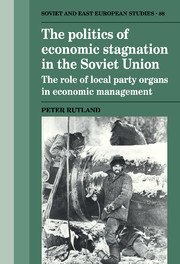 The Politics of Economic Stagnation in the Soviet Union
The Politics of Economic Stagnation in the Soviet Union Published online by Cambridge University Press: 06 July 2010
This chapter addresses the general pattern of party interventions in industrial decision making. Chapter 3 examines three specific policy areas where the party organs played a particularly active role – supply procurement, quality control and conservation. Construction and consumer goods production are studied under the rubric of regional coordination (chapter 5), and chapter 6 is devoted to party campaigns in transport and energy.
This chapter focusses on the relationship between party organs and management officials in routine production-related decision-making. Questions of personnel selection, training and promotion are addressed in chapter 9.
The first section establishes that party officials were expected to make sure that plants under their jurisdiction met their plan targets, primarily through exhortation and criticism directed at economic managers. It is unclear, however, just how crucial satisfactory plan performance was to a party official's future career.
The chapter then looks at the role of the party in promoting innovation through integrated science policies, and in the following section examines routine party oversight of technical/production decisions, of efficiency drives, of labour policy, and of enterprise reconstruction.
The next general question addressed is the balance of power between the party and ministerial hierarchies: the autonomy of local directors, and the problems local organs had in dealing with the powerful central ministries. This was the most important factor limiting party influence over the running of Soviet industry. The final section looks at the role played by party organs in attempts to introduce changes and reforms into the Soviet economic mechanism.
To save this book to your Kindle, first ensure no-reply@cambridge.org is added to your Approved Personal Document E-mail List under your Personal Document Settings on the Manage Your Content and Devices page of your Amazon account. Then enter the ‘name’ part of your Kindle email address below. Find out more about saving to your Kindle.
Note you can select to save to either the @free.kindle.com or @kindle.com variations. ‘@free.kindle.com’ emails are free but can only be saved to your device when it is connected to wi-fi. ‘@kindle.com’ emails can be delivered even when you are not connected to wi-fi, but note that service fees apply.
Find out more about the Kindle Personal Document Service.
To save content items to your account, please confirm that you agree to abide by our usage policies. If this is the first time you use this feature, you will be asked to authorise Cambridge Core to connect with your account. Find out more about saving content to Dropbox.
To save content items to your account, please confirm that you agree to abide by our usage policies. If this is the first time you use this feature, you will be asked to authorise Cambridge Core to connect with your account. Find out more about saving content to Google Drive.